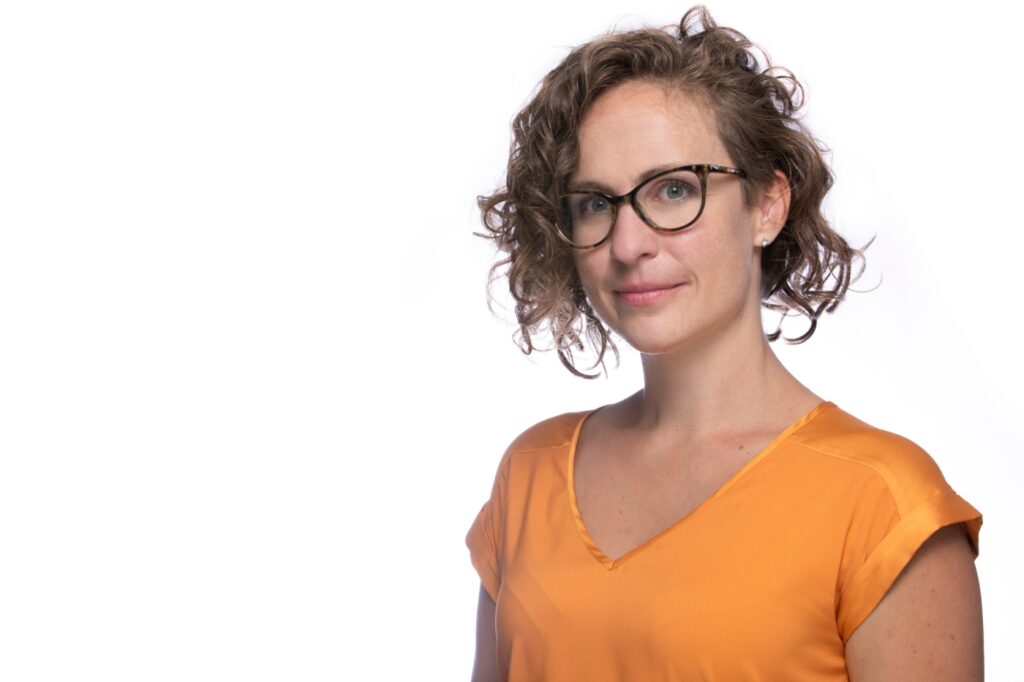
During her undergraduate years at St. Edward’s University, a private liberal arts college that stands on the highest point in Austin, Texas, Amanda Rose Villarreal’s career as a defensive specialist in volleyball ended when she got injured.
So, the native of rural Washington state, who attended St. Edward’s on an acting scholarship, pivoted.
“I convinced the athletic department to let me become the school mascot to maintain my scholarship,” Villarreal recalled. “They didn’t have a mascot performer at the time.”
And, thus, was born Topper (he bleats blue and gold).
“Essentially, I was a giant billy goat,” Villarreal said with a laugh. “I created the character of Topper and trained others to take over.”
Being a mascot was one of Villarreal’s first experiences in immersive performance and interacting closely with an audience.
Now, she’s bringing those talents to CSUF as an assistant professor of theater education in the Department of Theatre and Dance.
Villarreal joined CSUF last August to assist in the creation of a new theater education credential.
“There’s been a gap in training for theater teachers to teach theater specifically,” she said. “Most of the training has focused on the English and literary side.”
Villarreal also has been tasked with developing a new undergraduate degree in theater education — one that will be much richer and more varied than traditional courses that teach acting for live stage productions.
“Most of the students in today’s K-12 educational system have been raised digitally connected, and the practice of theater needs to adapt to that,” Villarreal said.
Her students at CSUF will study and train to become the next generation of high school theater teachers — ones well-versed in the latest advancements that are developing in immersive performance, virtual reality, and live-action role players, or “larpers.”
The COVID-19 pandemic, although it forced Broadway and other theaters to go dark, jump-started these thoroughly modern forms of art and performance, with artists confined for months to their homes having to rely on digital platforms to hone their craft.
More than acting
CSUF’s undergraduate degree in theater education still is months away. But Villarreal’s past and recent experiences as an immersive artist and intimacy choreographer (one who creates cultures where other artists feel empowered to tell the clearest story possible without violating their own personal boundaries) provide a clear picture of what CSUF theater majors should expect.
During the early stages of the pandemic, Villarreal participated in a VR adaptation of Shakespeare’s “The Tempest.” Actors engaged with each other to create their own narrative, and the audience was invited to participate in creating the production.
Villarreal also directed “She Kills Monsters: Virtual Realms,” which was featured in the Region 7 Kennedy Center American College Theater Festival. Recorded on Zoom, the performers did their own lighting, created their own costumes, and used their own props to create, edit, and share their own videos (something most of them do in similar fashion on digital social media platforms like Tik Tok and Instagram).
“I had students tell me they got to create more of a performance instead of just acting,” said Villarreal, who earned her master’s degree in theater production from Central Washington University and her doctorate in theater and performance studies from the University of Colorado.
“They felt empowered to have more agency in the creation of the overall piece than was traditional for them, and we’ve seen many of these examples during the pandemic,” she said.
Far from dead
COVID-19 may have killed — for a while — traditional theater. But it’s been good for innovators within theater, Villarreal said.
“Theater practitioners have complained, ‘Oh, cinema is killing theater,” she said. “Cinema has never killed theater. Prior to that, it was, ‘Radios are going to kill theater.’ There’s always been this belief that theater’s going to die. But theater will never die unless theater stops adapting to the needs of society.”
Villarreal is embracing lessons learned during COVID.
“Theater educators need to be able to use a digital paradigm that embraces epistemologies of choice in creating, editing, sharing, experiencing and commenting about art,” she said. “These new forms of immersive performances engage both artists and audiences in the act of creative narratives that can feel very liberating, especially after coming back from being isolated under COVID.
“It can feel like radical interaction for a participant to be able to interact with another person and allow a story to unfold, especially since we’ve been secluded for so long.”
CSUF has a new undergraduate bachelor’s degree in fine arts and devised performance, which is when actors get together to create a story together. And the department is hoping to produce an immersive site-specific work in the coming academic year, Villarreal said.
“It’s really exciting to be at a place where I have the opportunity to call upon the theater artists that I work with here to break down the silos and stop self-isolating and create theater that spurs change,” she said.
Related Articles
Supreme Court nominee brings diversity, a new perspective
Cal State Fullerton can’t keep up with Duke in NCAA Tournament loss
Cal State Fullerton vs. Duke: Live updates for NCAA Tournament first-round game
War in Ukraine casts a cloud over CSUF economic forecast
Student documentary on Latinos’ pandemic challenges up for college TV award
